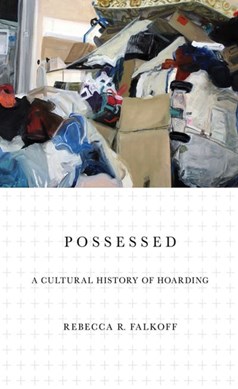-
BROWSE 1000s OF BOOKS IN STOCK
-
FREE DELIVERY ON ORDERS OVER €10
Possessed
PAPERBACK
In Possessed , Rebecca R. Falkoff asks how hoarding-once a paradigm of economic rationality-came to be defined as a mental illness. Hoarding is unique among the disorders included in the American Psychiatric Association's DSM-5, because its diagnosis requires the existence of a material entity: the hoard. Possessed therefore considers the hoard as an aesthetic object produced by clashing perspectives about the meaning or value of objects. The 2000s have seen a surge of cultural interest in hoarding and those whose possessions overwhelm their living spaces. Unlike traditional economic elaborations of hoarding, which focus on stockpiles of bullion or grain, contemporary hoarding results in accumulations of objects that have little or no value or utility. Analyzing themes and structures of hoarding across a range of literary and visual texts-including works by Nikolai Gogol, Arthur Conan Doyle, Carlo Emilio Gadda, Luigi Malerba, Song Dong and E. L. Doctorow-Falkoff traces the fraught materialities of the present to cluttered spaces of modernity: bibliomaniacs' libraries, flea markets, crime scenes, dust-heaps, and digital archives. Possessed shows how the figure of the hoarder has come to personify the economic, epistemological, and ecological conditions of modernity. Thanks to generous funding from New York University and its participation in TOME (Toward an Open Monograph Ecosystem), the ebook editions of this book are available as Open Access (OA) volumes from Cornell Open (cornellpress.cornell.edu/cornell-open) and other Open Access repositories.
€24.64

73 Reward Points
In stock online
Extended Range: Delivery in 2-3 working days
Extended Range: Delivery in 2-3 working days
Free Delivery on this item
Any purchases for more than €10 are eligible for free delivery anywhere in the UK or Ireland!
In Possessed , Rebecca R. Falkoff asks how hoarding-once a paradigm of economic rationality-came to be defined as a mental illness. Hoarding is unique among the disorders included in the American Psychiatric Association's DSM-5, because its diagnosis requires the existence of a material entity: the hoard. Possessed therefore considers the hoard as an aesthetic object produced by clashing perspectives about the meaning or value of objects. The 2000s have seen a surge of cultural interest in hoarding and those whose possessions overwhelm their living spaces. Unlike traditional economic elaborations of hoarding, which focus on stockpiles of bullion or grain, contemporary hoarding results in accumulations of objects that have little or no value or utility. Analyzing themes and structures of hoarding across a range of literary and visual texts-including works by Nikolai Gogol, Arthur Conan Doyle, Carlo Emilio Gadda, Luigi Malerba, Song Dong and E. L. Doctorow-Falkoff traces the fraught materialities of the present to cluttered spaces of modernity: bibliomaniacs' libraries, flea markets, crime scenes, dust-heaps, and digital archives. Possessed shows how the figure of the hoarder has come to personify the economic, epistemological, and ecological conditions of modernity. Thanks to generous funding from New York University and its participation in TOME (Toward an Open Monograph Ecosystem), the ebook editions of this book are available as Open Access (OA) volumes from Cornell Open (cornellpress.cornell.edu/cornell-open) and other Open Access repositories.

73 Reward Points
Any purchases for more than €10 are eligible for free delivery anywhere in the UK or Ireland!
€24.64

73 Reward Points
Any purchases for more than €10 are eligible for free delivery anywhere in the UK or Ireland!
Product Description
In Possessed , Rebecca R. Falkoff asks how hoarding-once a paradigm of economic rationality-came to be defined as a mental illness. Hoarding is unique among the disorders included in the American Psychiatric Association's DSM-5, because its diagnosis requires the existence of a material entity: the hoard. Possessed therefore considers the hoard as an aesthetic object produced by clashing perspectives about the meaning or value of objects. The 2000s have seen a surge of cultural interest in hoarding and those whose possessions overwhelm their living spaces. Unlike traditional economic elaborations of hoarding, which focus on stockpiles of bullion or grain, contemporary hoarding results in accumulations of objects that have little or no value or utility. Analyzing themes and structures of hoarding across a range of literary and visual texts-including works by Nikolai Gogol, Arthur Conan Doyle, Carlo Emilio Gadda, Luigi Malerba, Song Dong and E. L. Doctorow-Falkoff traces the fraught materialities of the present to cluttered spaces of modernity: bibliomaniacs' libraries, flea markets, crime scenes, dust-heaps, and digital archives. Possessed shows how the figure of the hoarder has come to personify the economic, epistemological, and ecological conditions of modernity. Thanks to generous funding from New York University and its participation in TOME (Toward an Open Monograph Ecosystem), the ebook editions of this book are available as Open Access (OA) volumes from Cornell Open (cornellpress.cornell.edu/cornell-open) and other Open Access repositories.
Product Details
ISBN9781501752803
FormatPAPERBACK
PublisherCORNELL UNIVERSITY PRESS (15 May. 2021)
No. of Pages0
Weight360
Language English
Dimensions 216 x 140 x 15

